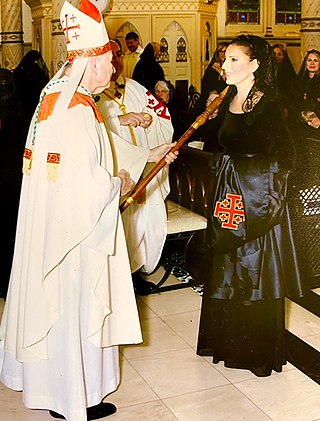Related Research Articles
In the United Kingdom and the British Overseas Territories, personal bravery, achievement, or service are rewarded with honours. The honours system consists of three types of award:

The Most Excellent Order of the British Empire is a British order of chivalry, rewarding contributions to the arts and sciences, work with charitable and welfare organizations, and public service outside the civil service. It was established on 4 June 1917 by King George V and comprises five classes across both civil and military divisions, the most senior two of which make the recipient either a knight if male or dame if female. There is also the related British Empire Medal, whose recipients are affiliated with, but not members of, the order.
Sir is a formal honorific address in English for men, derived from Sire in the High Middle Ages. Both are derived from the old French "Sieur" (Lord), brought to England by the French-speaking Normans, and which now exist in French only as part of "Monsieur", with the equivalent "My Lord" in English. Traditionally, as governed by law and custom, Sir is used for men who are knights and belong to certain orders of chivalry, as well as later applied to baronets and other offices. As the female equivalent for knighthood is damehood, the suo jure female equivalent term is typically Dame. The wife of a knight or baronet tends to be addressed as Lady, although a few exceptions and interchanges of these uses exist.

The title of Knight Bachelor is the basic rank granted to a man who has been knighted by the monarch but not inducted as a member of one of the organised orders of chivalry; it is a part of the British honours system. Knights Bachelor are the most ancient sort of British knight, but Knights Bachelor rank below knights of chivalric orders. A man who is knighted is formally addressed as "Sir [First Name] [Surname]" or "Sir [First Name]" and his wife as "Lady [Surname]".
Sir David Brunt, KBE, FRS was a Welsh meteorologist. He was Professor of Meteorology at Imperial College, London from 1934 to 1952. He was vice-president of the Royal Society from 1949 to 1957. The Brunt Ice Shelf in Antarctica is named after him.

Dame is an honorific title and the feminine form of address for the honour of damehood in many Christian chivalric orders, as well as the British honours system and those of several other Commonwealth realms, such as Australia and New Zealand, with the masculine form of address being Sir. It is the female equivalent of a knighthood, which is traditionally granted to males. Dame is also a style used by baronetesses in their own right.

Frederick William was a German sovereign who ruled over the state of Mecklenburg-Strelitz as grand duke from 1860 until his death.
The 1904 Birthday Honours were announced on 9 November 1904, to celebrate the birthday of King Edward VII that day. The list included appointments to various orders and honours of the United Kingdom and the British Empire.
Sir John Tom McCraith was a British Conservative and Unionist politician who served in a range of senior political positions on the Nottingham City Council.
Sir James William McCraith, JP was a local politician who served as the Conservative and Unionist Party Leader in Nottingham.
Sir Douglas McCraith, JP was a British solicitor, Conservative local politician and sportsperson from Nottingham.
References
- ↑ "The British Honours System". www.churchill-society-london.org.uk. Retrieved 29 October 2020.
- ↑ "Knight Bachelor", Encyclopedia Britannica . Retrieved 5 April 2020.
- ↑ "Guide to the Honours". BBC News. 6 June 2019. Retrieved 29 October 2020.
- ↑ Shaw records his name as "John Lowe McCraith", but he is "John Tom" in Walford's County Families (1919, p. 861); see also "The New Local Knights: Mr J. T. McCraith", Nottingham Evening Post, 9 November 1904, p. 3.